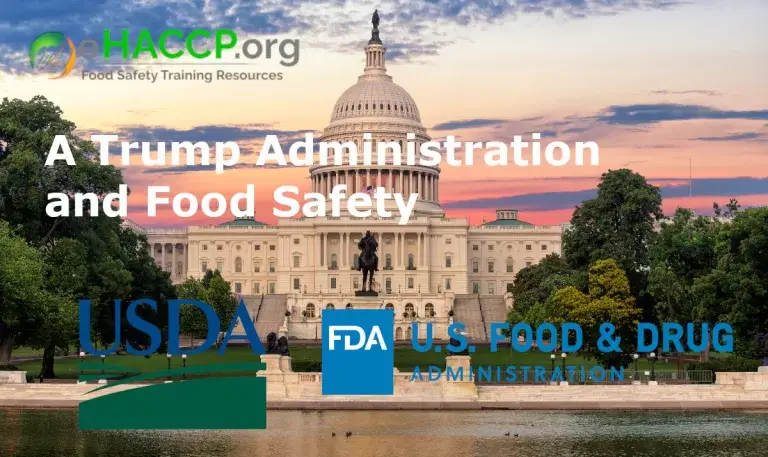I must preface this article/blog with a statement in fact, this is speculation about the future of food safety. HACCP. the FSMA, under a President Trump administration. I am making a safe assumption that President Donald Trump and his appointments are conservative in their approach to fiscal responsibility, economic development, etc. This isn’t a pro or anti position but just speculation about potential near and mid-future changes to food safety regulations.
Conservatives and liberals both want safe food, but they have different ideas about how to get there. Conservatives tend to focus on a few key things:
Tough on crime: They believe in strong police forces, strict punishments for criminals, and making sure laws are followed. They think this makes people less likely to commit crimes in the first place.
Food safety crimes can range from unintentional errors to deliberate acts of fraud, with punishments varying depending on the severity and intent. Here’s a breakdown:
Types of Food Safety Crimes:
Adulteration: This involves adding harmful substances to food or altering it in a way that makes it unsafe. Examples include adding melamine to milk to increase protein levels or using unapproved dyes in food.
Misbranding: Providing false or misleading information on food labels, such as incorrect ingredients, nutritional values, or origin. This can also include failing to disclose allergens.
Food fraud: Economically motivated adulteration, like substituting cheaper ingredients for expensive ones (e.g., using horsemeat instead of beef) or misrepresenting the origin of food (e.g., selling farmed salmon as wild-caught).
Negligence: Failing to follow proper food handling and storage procedures, leading to contamination or spoilage. This can include improper temperature control, poor hygiene, or cross-contamination.
Unsanitary conditions: Operating a food establishment in unsanitary conditions that could lead to food contamination, such as pest infestations, inadequate waste disposal, or lack of handwashing facilities.
Punishments: The consequences for food safety crimes can vary widely depending on the jurisdiction and the specific offense. They can include:
Fines: Monetary penalties can range from relatively small sums for minor violations to millions of dollars for large-scale fraud or adulteration that causes widespread harm.
Imprisonment: In severe cases, especially those involving intentional harm or death, individuals may face jail time. Sentences can range from a few months to several years.
License revocation: Food businesses can lose their licenses to operate if they are found guilty of serious food safety violations.
Product recalls: Contaminated or misbranded products can be recalled from the market, often at significant cost to the responsible company.
Civil lawsuits: Individuals who suffer harm from unsafe food can sue the responsible parties for damages.
Examples of Laws and Regulations:
In the US: The Food Safety Modernization Act (FSMA) strengthens food safety regulations and increases penalties for violations. The Food, Drug, and Cosmetic Act (FD&C Act) also addresses food safety and sets standards for food production and labeling.
In Canada: The Safe Food for Canadians Act outlines regulations for food safety and sets penalties for violations.
Internationally: The Codex Alimentarius provides international food standards, guidelines, and codes of practice to protect consumer health.
It’s important to note that enforcement varies, and many factors influence the specific punishment, including the severity of the offense, the intent of the violator, the extent of harm caused, and the company’s history of compliance.
Less government, more freedom: Conservatives are often wary of government programs trying to fix the root causes of crime, like poverty. They think these programs can be expensive and don’t always work. Instead, they prefer to focus on individual responsibility and letting communities find their own solutions.
When it comes to food safety, conservatives have a similar mindset:
Stick to the rules: They believe in strictly enforcing existing food safety laws and making sure companies follow them.
Less red tape: They’re cautious about adding new regulations, worrying that too many rules can stifle businesses and slow down the economy.
Empowering consumers: They believe people should be educated about food safety and make informed choices about what they eat.
Of course, not all conservatives think exactly alike. There’s a range of opinions within any political group. But these are some of the main ideas that shape how conservatives think about public safety and food safety.
In conclusion, conservatives tend to favor established systems and might be hesitant to fully replace HACCP with the newer Preventive Controls for Human Food. But it’s also important to remember that the food industry is constantly evolving, and regulations need to adapt to keep up.
Here’s my stab at food safety and political humor:
Q: Why did the conservative cross the road?
A: To protest the government-mandated chicken crossing signals! He believes in free-range poultry and individual responsibility, even for chickens!
(He also mumbled something about the regulations stifling the entrepreneurial spirit of road-crossing chickens and how it was all probably part of a socialist plot to control the means of poultry production.)
I am so sorry! Please don’t block me! LOL!!!

